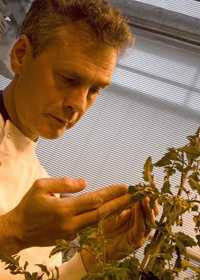Seed treatment discovery could cut pesticide use

Lancaster University researchers have discovered a potential new way of making crops resilient to pests.
Jasmonic acid (JA) is one of a plant's natural defences against being eaten. When a bug takes a bite of one of its leaves, JA is one of the chemical signals that warn other leaves to mobilise their pest defences - making them difficult to digest.
It has long been understood that by spraying crops with JA plants stand a better chance of repelling pests like mites, caterpillars and aphids – however sprayed plants grow less well.
But scientists working at Lancaster University's Environment Centre have found that plants grown from seeds first dipped in JA are also more pest-resilient without any loss of growth.
This would be financially beneficial for farmers and growers - as seeds are cheaper to treat than entire crops. It is another tool for growers to use as an alternative to using large amounts of pesticides or GM technologies.
In early trials at Lancaster University, the best results were on tomato plants, where attacks by Red Spider Mites were reduced by 80 per cent, aphid attack was reduced by 60 per cent and caterpillar damage was down by a third.
Good results were also obtained on sweet pepper where aphid attacks were reduced by 70 per cent, and caterpillar damage to wheat was reduced by 65 per cent. Meanwhile on maize, caterpillar damage was reduced by 38 per cent.
The original work was carried out in a number of projects funded by the Natural Environment Research Council and the Horticultural Development Council.
Dr Nigel Paul of Lancaster University, who led the research said: "We were investigating the mechanisms by which wild plants defend themselves against pest attack to get a better understanding of what works in nature. We were spraying the leaves of our plants with JA and wondered what would happen if we treated the seeds instead.
"It seemed unlikely that it would work but we were amazed to discover that it did - tomato plants were protected for about two months after they germinated."
Results from large scale field trials are due at the end of the year. In the meantime, with new funding from Defra, the team at Lancaster – including Nigel Paul, Mike Roberts and Jane Taylor - is developing new applications for the technology, including investigating its value in disease control.
By the end of the year, the University should know whether or not a commercial product will go into development.